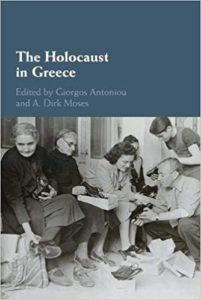
Finifter Panel on The Holocaust in Greece
Tuesday, March 23rd, 12:30-2:30 pm | Register Here
The Third Perspective on the Holocaust: Non-Jews and the German Murder of their Jewish Neighbours
Historians write about the Holocaust generally from the perspectives of the German perpetrators or the Jewish victims. This means that they miss the vital non-Jewish perspective, in particular the national and local governments that played an important role in facilitating the German murder of their Jewish citizens. This talk will explore non-Jewish involvement in the murder of the Greek Jews of Salonika, the city in which 70% of Greece’s Jewish population lived on the eve of World War II.
Andrew Apostolou is the first historian to have written about Greek Christian collaboration during the Holocaust in Greece in an academic journal. He earned his DPhil from St. Antony’s, Oxford, for “The Exception of Salonika: Greek Christian Reactions to the Holocaust” (forthcoming as a monograph).
A City against Its Citizens? Thessaloniki and the Jews
The presentation will focus on the reactions of Thessaloniki’s city authorities as the Holocaust was unfolding. In so doing, it seeks to answer the questions: did the Christian society stand up for the defense of the city’s Jews and did they try to undermine or object to the Nazi orders? Using archives from the City of Thessaloniki and several other sources, five case studies will be presented: the renaming of the streets with Jewish names prior to the deportations; the city’s involvement with the destruction of the Jewish cemetery; the use by the city of Jewish slave labor; the replacing of the Jewish employees in the municipality of Thessaloniki; and the acquisition of Jewish property.
Leon Saltiel holds a PhD in Contemporary Greek History from the University of Macedonia in Thessaloniki and has received postdoctoral fellowships at the Graduate Institute of International and Development Studies in Geneva and the Aristotle University of Thessaloniki.
Revisiting Bystanders, Rescuers and Collaborators: Social Distancing and Social Networks in Thessaloniki before and during the Holocaust
The paper will examine the importance of prewar ‘social distancing’, i.e. the cultural, class and linguistic barriers between Christians and Jews in Thessaloniki, in relation to the low probability of survival (4%) among the members of the community. The paper will then analyze the various networks of survival based on prewar social ties and relations (cultural linguistic, class). What kind of social capital did prewar relations create and was it important for increasing the possibility of survival?
Giorgos Antoniou is Assistant Professor of Jewish Studies at Aristotle University of Thessaloniki. He currently holds the Chair of Jewish Studies and is a member of European Holocaust Research Infrastructure and International Holocaust Remembrance Alliance. His current research interests include the study of contemporary antisemitism in Greece, datasets and demographics of the Thessaloniki Jewish community, survival and social networking, and the commemoration of the Holocaust in Greece.
